|
Books Should Be Free Loyal Books Free Public Domain Audiobooks & eBook Downloads |
|
|
Books Should Be Free Loyal Books Free Public Domain Audiobooks & eBook Downloads |
|
Biographies |
|---|
Book type:
Sort by:
View by:
|
By: Leo Tolstoy (1828-1910) | |
|---|---|
 Childhood (English trans.)
Childhood (English trans.)
Childhood, published in 1852, is the first novel in Leo Tolstoy’s autobiographical trilogy, which also includes Boyhood, and Youth. Published when Tolstoy was twenty-three, the book gained immediate notice among Russian writers including Ivan Turgenev, and heralded the young Tolstoy as a major figure in Russian letters. Childhood is an expressionist exploration of the internal life of a young boy, Nikolenka, and was a new form in Russian writing, mixing fact, fiction and emotions to render the moods and reactions of the narrator. Childhood is Tolstoy’s first published work. Translated into English by C. J. Hogarth. | |
 Youth
Youth
Youth is the third in Tolstoy's trilogy of three autobiographical novels, including Childhood and Boyhood, published in a literary journal during the 1850s. (Introduction by Bill Boerst) | |
By: Jack London (1876-1916) | |
|---|---|
 John Barleycorn or Alcoholic Memoirs
John Barleycorn or Alcoholic Memoirs
Jack London died at the age of forty. In this autobiographical work, London describes his life as seen through the eyes of John Barleycorn (alcohol). There is much controversy about the cause of his death just as there is about alcoholism and addiction. London’s brutally frank and honest analysis of his own struggles and bouts with alcohol was way before its time and more modern theories of addiction. With remarkable candor and insight, London describes the demons and gods he encountered through both friend and enemy, John Barleycorn. | |
By: Alexandre Dumas (1802-1870) | |
|---|---|
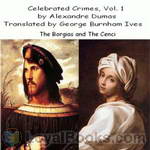 Celebrated Crimes
Celebrated Crimes
Dumas's 'Celebrated Crimes' was not written for children. The novelist has spared no language -- has minced no words -- to describe the violent scenes of a violent time.In some instances facts appear distorted out of their true perspective, and in others the author makes unwarranted charges. The careful, mature reader, for whom the books are intended, will recognize, and allow for, this fact.The first volume comprises the annals of the Borgias and the Cenci. The name of the noted and notorious Florentine family has become a synonym for intrigue and violence, and yet the Borgias have not been without stanch defenders in history... | |
By: G. K. Chesterton (1874-1936) | |
|---|---|
 Charles Dickens
Charles Dickens
G. K. Chesterton was a great admirer of Charles Dickens, and wrote a noted critique of Dickens’ works expressing his opinion in his own inimitable style. | |
 George Bernard Shaw
George Bernard Shaw
Chesterton and Shaw were famous friends and enjoyed their arguments and discussions. Although rarely in agreement, they both maintained good-will towards and respect for each other. However, in his writing, Chesterton expressed himself very plainly on where they differed and why. In Heretics he writes of Shaw: “After belabouring a great many people for a great many years for being unprogressive, Mr. Shaw has discovered, with characteristic sense, that it is very doubtful whether any existing human being with two legs can be progressive at all... | |
By: Louisa May Alcott (1832-1888) | |
|---|---|
 Hospital Sketches
Hospital Sketches
Alcott in 1862 served as a nurse in Georgetown, D.C during the Civil War. She wrote home what she observed there. Those harrowing and sometimes humorous letters compiled make up Hospital Sketches. | |
By: Elizabeth Gaskell (1810-1865) | |
|---|---|
 The Life Of Charlotte Brontë
The Life Of Charlotte Brontë
Charlotte Brontë was a British author, the eldest of the three famous Brontë sisters who have become standards of English literature. She is best known for her novel Jane Eyre, one of the greatest classics of all time. Just two years after Charlotte’s death, her friend Elizabeth Gaskell wrote her biography. Want to know more about Charlotte Brontë? If you do, please read this biography. | |
By: Joseph Conrad (1857-1924) | |
|---|---|
 The Mirror of the Sea
The Mirror of the Sea
The Mirror of the Sea is a collection of autobiographical essays first published in various magazines 1904-6. Conrad early in his life earned his bread as a Master Mariner in sailing ships. In his Author’s Note to this work, Conrad states,”Beyond the line of the sea horizon the world for me did not exist….Within these pages I make a full confession not of my sins but of my emotions. It is the best tribute my piety can offer to the ultimate shapers of my character, convictions, and, in a sense, destiny—to the imperishable sea, to the ships that are no more, and to the simple men who have had their day.” | |
By: Jacob Abbott (1803-1879) | |
|---|---|
 Peter the Great
Peter the Great
“There are very few persons who have not heard of the fame of Peter the Great, the founder, as he is generally regarded by mankind, of Russian civilization. The celebrity, however, of the great Muscovite sovereign among young persons is due in a great measure to the circumstance of his having repaired personally to Holland, in the course of his efforts to introduce the industrial arts among his people, in order to study himself the art and mystery of shipbuilding, and of his having worked with his own hands in a ship-yard there... | |
 Hannibal
Hannibal
There are certain names which are familiar, as names, to all mankind; and every person who seeks for any degree of mental cultivation, feels desirous of informing himself of the leading outlines of their history, that he may know, in brief, what it was in their characters or their doings which has given them so widely-extended a fame. Consequently, great historical names alone are selected; and it has been the writer's aim to present the prominent and leading traits in their characters, and all the important events in their lives, in a bold and free manner, and yet in the plain and simple language which is so obviously required in works which aim at permanent and practical usefulness... | |
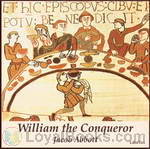 William the Conqueror
William the Conqueror
There are certain names which are familiar, as names, to all mankind; and every person who seeks for any degree of mental cultivation, feels desirous of informing himself of the leading outlines of their history, that he may know, in brief, what it was in their characters or their doings which has given them so widely-extended a fame. Consequently, great historical names alone are selected; and it has been the writer’s aim to present the prominent and leading traits in their characters, and all the important events in their lives, in a bold and free manner, and yet in the plain and simple language which is so obviously required in works which aim at permanent and practical usefulness... | |
 History of Julius Caesar
History of Julius Caesar
The book chronicles the extraordinary life and leadership of Rome’s Emperor Julius Caesar, from his early years to his assassination. | |
 Richard I
Richard I
There are certain names which are familiar, as names, to all mankind; and every person who seeks for any degree of mental cultivation, feels desirous of informing himself of the leading outlines of their history, that he may know, in brief, what it was in their characters or their doings which has given them so widely-extended a fame. Consequently, great historical names alone are selected; and it has been the writer’s aim to present the prominent and leading traits in their characters, and all the important events in their lives, in a bold and free manner, and yet in the plain and simple language which is so obviously required in works which aim at permanent and practical usefulness... | |
 Charles I
Charles I
There are certain names which are familiar, as names, to all mankind; and every person who seeks for any degree of mental cultivation, feels desirous of informing himself of the leading outlines of their history, that he may know, in brief, what it was in their characters or their doings which has given them so widely-extended a fame. Consequently, great historical names alone are selected; and it has been the writer’s aim to present the prominent and leading traits in their characters, and all the important events in their lives, in a bold and free manner, and yet in the plain and simple language which is so obviously required in works which aim at permanent and practical usefulness... | |
 Richard III
Richard III
Jacob Abbott chronicles the unspeakably treacherous rise of Richard III to the throne of England in the midst of the war between the Yorks and the Lancasters and his ultimate fall on the Field of Bosworth. (Introduction by Cathy Barratt) | |
By: Henry David Thoreau (1817-1862) | |
|---|---|
 Walden
Walden
Two years, two months and two days! This is what forms the time line of one man's quest for the simple life and a unique social experiment in complete self reliance and independence. Henry David Thoreau published Walden in 1884. Originally drafted as a series of essays describing a most significant episode in his life, it was finally released in book form with each essay taking on the form of a separate chapter. Thoreau's parents were in financial straights, but rich intellectually and culturally... | |
By: Anthony Trollope (1815-1882) | |
|---|---|
 The Life of Cicero
The Life of Cicero
Marcus Tullius Cicero (106-43BC) was an orator, statesman, philosopher and prolific correspondent, who rose as a ‘new man’ in Rome in the turbulent last years of its republican government. Anthony Trollope, best known as a novelist, admired Cicero greatly and wrote this biography late in life in order to argue his virtues against authors who had granted him literary greatness but questioned his strength as a politician and as a man. He takes a personal approach, affording us an insight into his own mind and times as well as those of his subject... | |
 Autobiography of Anthony Trollope
Autobiography of Anthony Trollope
Anthony Trollope's autobiography will delight you whether or not you've read (or listened to) any of his many works. His honest if self-deprecating tone is at times hilarious and at times piteously moving. His detailed descriptions of his writing process and his philosophy of writing as work rather than art are fascinating. Fans of Trollope will enjoy learning the man's perceptions of his novels' shortcomings and triumphs. Anyone will appreciate learning about his years devoted to churning out literature for profit while working full time with the post office. | |
By: Charles Darwin (1809-1882) | |
|---|---|
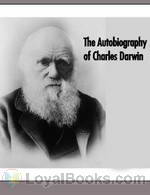 The Autobiography of Charles Darwin
The Autobiography of Charles Darwin
The Autobiography of Charles Darwin is the autobiography of the British naturalist Charles Darwin which was published in 1887, five years after his death. Darwin wrote the book, which he entitled Recollections of the Development of my Mind and Character, for his family. He states that he started writing it on about May 28, 1876 and had finished it by August 3. The book was edited by Charles Darwin’s son Francis Darwin, who removed several passages about Darwin’s critical views of God and Christianity... | |
By: James Baldwin (1841-1925) | |
|---|---|
 Four Great Americans: Washington, Franklin, Webster, Lincoln. A Book for Young Americans
Four Great Americans: Washington, Franklin, Webster, Lincoln. A Book for Young Americans
Written for children, James Baldwin’s history of Washington, Franklin, Webster, and Lincoln brings these men to life in a way that will be interesting for adults as well. The stories touch on the little humanities of the great men, rather than dwelling on the great works and great events of their lifetimes, without ignoring the latter. | |
By: John Bunyan (1628-1688) | |
|---|---|
 Grace Abounding to the Chief of Sinners
Grace Abounding to the Chief of Sinners
Grace Abounding is the spiritual autobiography of John Bunyan, who also penned Pilgrim’s Progress, perhaps one of the most significant pieces of Christian literature, second only to the Bible. Grace Abounding follows Bunyan’s struggle to find true repentance and forgiveness, his battle with Satan’s temptations of unbelief, his comfort found in the Bible and his overarching victory gotten by the grace of God through Jesus Christ his Son. Readers familiar with Pilgrim’s Progress will recognize... | |
By: Helen Keller (1888-1968) | |
|---|---|
 The Story of My Life
The Story of My Life
An autobiography of Helen Keller published when the author was still in her early 20's. The narrative reveals how her mind developed and matured until she began her studies at Radcliffe College | |
 The World I Live In
The World I Live In
The World I Live In by Helen Keller is a collection of essays that poignantly tells of her impressions of the world, through her sense of touch, smell, her imagination and dreams. My hand is to me what your hearing and sight together are to you. In large measure we travel the same highways, read the same books, speak the same language, yet our experiences are different. All my comings and goings turn on the hand as on a pivot. It is the hand that binds me to the world of men and women. The hand is my feeler with which I reach through isolation and darkness and seize every pleasure, every activity that my fingers encounter... | |
By: Benjamin Franklin (1706-1790) | |
|---|---|
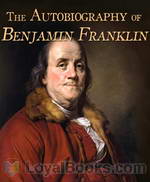 The Autobiography of Benjamin Franklin
The Autobiography of Benjamin Franklin
Inventor, author, printer, scientist, politician, diplomat—all these terms do not even begin to fully describe the amazing and multitalented, Benjamin Franklin who was of course also one of the Founding Fathers of America. At the age of 75, in 1771 he began work on what he called his Memoirs. He was still working on it when he died in 1790 and it was published posthumously, entitled An Autobiography of Benjamin Franklin. The book had a complicated and controversial publication history. Strangely enough, the first volume only was first published in French, in Paris in 1791... | |
By: Ralph Waldo Emerson (1803-1882) | |
|---|---|
 Representative Men
Representative Men
A series of biographical lectures originally published in 1850. Each chapter is a philosophical treatment of the life of an intellectual. The six representatives are Plato, Swedenborg, Shakespeare, Montaigne, Napolean and Goethe. (Introduction by S. Kovalchik) | |
By: John Muir (1838-1914) | |
|---|---|
 My First Summer in the Sierra
My First Summer in the Sierra
The journal of nature-lover John Muir who spent the summer of 1869 walking California’s Sierra Nevada range. From French Bar to Mono Lake and the Yosemite Valley, Muir was awestruck by everything he saw. The antics of the smallest “insect people” amazed him as much as stunted thousand-year old Juniper trees growing with inconceivable tenacity from tiny cracks in the stone. Muir spent the rest of his life working to preserve the high Sierra, believing that “the clearest way into the Universe is through a forest wilderness.” John Muir (1838-1914) was born in Dunbar, Scotland and grew up in Wisconsin, USA. This recording commemorates the 140th anniversary of that first summer. | |
 The Story of My Boyhood and Youth
The Story of My Boyhood and Youth
“The only fire for the whole house was the kitchen stove, with a fire box about eighteen inches long and eight inches wide and deep,- scant space for three or four small sticks, around which in hard zero weather all the family of ten shivered, and beneath which in the morning we found our socks and coarse, soggy boots frozen solid.” Thus, with perceptive eye for detail, the American naturalist, John Muir, describes life on a pioneer Wisconsin farm in the 1850’s. Muir was only eleven years old when his father uprooted the family from a relatively comfortable life in Dunbar, Scotland, to settle in the backwoods of North America... | |
 Travels in Alaska
Travels in Alaska
In 1879 John Muir went to Alaska for the first time. Its stupendous living glaciers aroused his unbounded interest, for they enabled him to verify his theories of glacial action. Again and again he returned to this continental laboratory of landscapes. The greatest of the tide-water glaciers appropriately commemorates his name. Upon this book of Alaska travels, all but finished before his unforeseen departure, John Muir expended the last months of his life. | |
 Steep Trails
Steep Trails
A collection of Muir's previously unpublished essays, released shortly after his death. "This volume will meet, in every way, the high expectations of Muir's readers. The recital of his experiences during a stormy night on the summit of Mount Shasta will take rank among the most thrilling of his records of adventure. His observations on the dead towns of Nevada, and on the Indians gathering their harvest of pine nuts, recall a phase of Western life that has left few traces in American literature... | |
By: John Stuart Mill (1806-1873) | |
|---|---|
 Auguste Comte and Positivism
Auguste Comte and Positivism
Part 1 lays out the framework for Positivism as originated in France by Auguste Comte in his Cours de Philosophie Positive. Mill examines the tenets of Comte's movement and alerts us to defects. Part 2 concerns all Comte's writings except the Cours de Philosophie Positive. During Comte's later years he gave up reading newspapers and periodicals to keep his mind pure for higher study. He also became enamored of a certain woman who changed his view of life. Comte turned his philosophy into a religion, with morality the supreme guide. Mill finds that Comte learned to despise science and the intellect, instead substituting his frantic need for the regulation of change. | |
By: William Wordsworth (1770-1850) | |
|---|---|
 The Prelude
The Prelude
Among monuments of narrative poetry, The Prelude; or, Growth of a Poet's Mind, by William Wordsworth, occupies a unique place. Wordsworth published the first version of the poem in 1798, but continued to work on it for the rest of his life. The final version, which is the subject of this recording, was published posthumously in 1850, by Wordworth’s widow, Mary. The Prelude is the first major narrative poem in European literature which deals solely with the spiritual journey of the author. In this respect the only predecessor to which it can be compared in Dante’s Divine Comedy, which is similarly a journey from personal confusion to certitude, from ignorance to realization... | |
By: Nellie Bly (1864-1922) | |
|---|---|
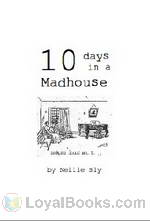 Ten Days in a Madhouse
Ten Days in a Madhouse
Long before Christiane Amanpour, Frances Fitzgerald and Martha Gellhorn blazed a trail in courageous investigative journalism, a pioneering and intrepid writer and journalist whose pen name was Nellie Bly opened up a whole new field in what had previously been a strictly male domain. Ten Days in a Madhouse was published as a series of articles in the New York World during 1887. Nellie Bly was given the assignment by her editor to have herself committed to an insane asylum in New York with a “view to writing a plain and unvarnished narrative of the treatment of patients therein and the methods of management... | |
By: Susanna Moodie (1803-1885) | |
|---|---|
 Roughing It in the Bush
Roughing It in the Bush
'Roughing It In the Bush' is Susanna Moodie's account of how she coped with the harshness of life in the woods of Upper Canada, as an Englishwoman homesteading abroad. Her narrative was constructed partly as a response to the glowing falsehoods European land-agents were circulating about life in the New World. Her chronicle is frank and humorous, and was a popular sensation at the time of its publication in 1852. | |
By: Sinclair Lewis | |
|---|---|
 The Trail of the Hawk
The Trail of the Hawk
| |
By: Publius Cornelius Tacitus | |
|---|---|
 Agricola
Agricola
The Agricola (Latin: De vita et moribus Iulii Agricolae, lit. On the life and character of Julius Agricola) is a book by the Roman historian Tacitus, written c 98, which recounts the life of his father-in-law Gnaeus Julius Agricola, an eminent Roman general. It also covers, briefly, the geography and ethnography of ancient Britain. As in the Germania, Tacitus favorably contrasts the liberty of the native Britons to the corruption and tyranny of the Empire; the book also contains eloquent and vicious polemics against the rapacity and greed of Rome. This translation by Alfred John Church and William Jackson Brodribb, was first published in 1877. | |
By: John H. Haaren (1855-1916) | |
|---|---|
 Famous Men of the Middle Ages
Famous Men of the Middle Ages
“THE study of history, like the study of a landscape, should begin with the most conspicuous features. Not until these have been fixed in memory will the lesser features fall into their appropriate places and assume their right proportions. The famous men of ancient and modern times are the mountain peaks of history. It is logical then that the study of history should begin with the biographies of these men. Not only is it logical; it is also pedagogical. Experience has proven that in order to attract and hold the child’s attention each conspicuous feature of history presented to him should have an individual for its center... | |
By: Flavius Josephus (37 - c.100) | |
|---|---|
 Minor Works of Josephus
Minor Works of Josephus
There are 3 parts to this collection.(1) Against Apion is a two-volume defense of Judaism as classical religion and philosophy, stressing its antiquity, as opposed to what Josephus claimed was the relatively more recent tradition of the Greeks. Some anti-Judean allegations ascribed by Josephus to the Greek writer Apion, and myths accredited to Manetho are also addressed.(2) Discourse To The Greeks Concerning Hades describes the author's views on the afterlife against the prevailing view of the "Greeks" (i... | |
By: Eugene Field (1850-1895) | |
|---|---|
 The Love Affairs of a Bibliomaniac
The Love Affairs of a Bibliomaniac
Do you love books? No, I mean REALLY love books? These series of sketches on the delights, adventures, and misadventures connected with bibliomania (bibliomania is characterized by the collecting of books which have no use to the collector nor any great intrinsic value to a genuine book collector. The purchase of multiple copies of the same book and edition and the accumulation of books beyond possible capacity of use or enjoyment are frequent symptoms of bibliomania.). The author wholeheartedly enjoyed this pursuit all his life and his descriptions are delightful to read... | |
By: Rabindranath Tagore (1861-1941) | |
|---|---|
 My Reminiscences
My Reminiscences
These Reminiscences were written and published by the Author in his fiftieth year, shortly before he started on a trip to Europe and America for his failing health in 1912. It was in the course of this trip that he wrote for the first time in the English language for publication. (from preface) | |
By: Charles Morris (1833-1922) | |
|---|---|
 The San Francisco Calamity by Earthquake and Fire
The San Francisco Calamity by Earthquake and Fire
The first half of this book describes the devastating earthquake that hit San Francisco in 1906, and the subsequent destruction caused by fire. Various eyewitnesses and victims give their account on the tragedy. In the second half, a number of different other earthquakes and volcanic eruptions are retold, like the eruption of the Vesuvius that destroyed Pompeij or the explosion of the Krakatoa, together with scientific explanations for the causes of earthquakes and the eruption of volcanos. | |
By: Lucius Mestrius Plutarchus | |
|---|---|
 Parallel Lives of the Noble Greeks and Romans, translated by Bernadotte Perrin (1847-1920)
Parallel Lives of the Noble Greeks and Romans, translated by Bernadotte Perrin (1847-1920)
Plutarch’s “Parallel Lives of the Noble Greeks and Romans Volume 1, translated by Bernadotte Perrin. | |
By: Santa Teresa de Jesus (1515-1582) | |
|---|---|
 The Life of St. Teresa
The Life of St. Teresa
Saint Teresa of Ávila, also called Saint Teresa of Jesus, baptized as Teresa Sánchez de Cepeda y Ahumada, (March 28, 1515, at Gotarrendura (Ávila), Old Castile, Spain – October 4, 1582, at Alba de Tormes, Salamanca, Spain) was a prominent Spanish mystic, Carmelite nun, and writer of the Counter Reformation. She was a reformer of the Carmelite Order and is considered to be, along with John of the Cross, a founder of the Discalced Carmelites. In 1970 she was named a Doctor of the Church by Pope Paul VI. | |
By: Oliver Goldsmith (1730-1774) | |
|---|---|
 The Life of Richard Nash, Esq., Late Master of the Ceremonies at Bath
The Life of Richard Nash, Esq., Late Master of the Ceremonies at Bath
Beau Nash (1674–1762), born Richard Nash, was a celebrated dandy and leader of fashion in 18th-century Britain. He is best remembered as the Master of Ceremonies at the spa town of Bath. (Wikipedia)This, the best of Goldsmith's Biographies, was published the year after Nash's death. It was at once popular, and went through two editions in the same year in which it was published. To the second edition (it never reached a third), Goldsmith made many important additions. Yet strange to say none of these have been attended to by the editors of his Works... | |
By: L. A. Abbott (1813-??) | |
|---|---|
 Seven Wives and Seven Prisons
Seven Wives and Seven Prisons
This work the author claims is indeed a true story of how he happened to be married seven times to seven different women and the rollicking, hilarious events that led (or stumbled) to the marriages and the ah–disassembling/failing/failures of each said marriage which happened oftentimes to land him in prison. The summarist finds the work a very tongue-in-cheek diatribe/lament/account of his obsessive zeal in ‘marrying the right one’, but is also the mirthful chronicle of said author’s very unconventional adventures. | |
By: Thomas Bulfinch | |
|---|---|
 The Legends of Charlemagne
The Legends of Charlemagne
Bulfinch (July 15, 1796 - May 27, 1867) explains the his work is "an attempt tell the stories of mythology in such a manner as to make them a source of amusement. We have endeavored to tell them correctly, according to the ancient authorities, so that when the reader finds them referred to he may not be at a loss to recognize the reference. Thus we hope to teach mythology not as a study, but as a relaxation from study; to give our work the charm of a story-book, yet by means of it to impart a knowledge of an important branch of education... | |
By: Mary Harris Jones (1830 or 1837-1930) | |
|---|---|
 The Autobiography of Mother Jones
The Autobiography of Mother Jones
Mother Jones (Mary Harris Jones) was a legendary labor organizer. She was a founding member of the International Workers of the World (the IWW, or the Wobblies), and was active in the United Mine Workers and the Socialist Party of America. | |
By: Nat Love (1854-1921) | |
|---|---|
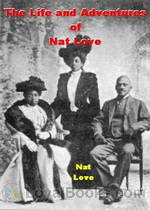 The Life and Adventures of Nat Love, Also Known As Deadwood Dick
The Life and Adventures of Nat Love, Also Known As Deadwood Dick
Nat Love was born a slave, emancipated into abject poverty, grew up riding the range as a cowboy and spent his maturity riding the rails as a Pullman Porter. For me, the most amazing thing about him is that despite the circumstances of his life, which included being owned like a farm animal solely because of the color of his skin and spending later decades living and working as an equal with white coworkers, he was an unrepentant racist! Convinced that the only good Indian was a dead one, and that... | |
By: Frank Lewis Dyer and Thomas Commerford Martin | |
|---|---|
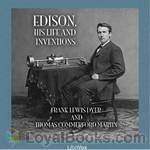 Edison, His Life and Inventions
Edison, His Life and Inventions
One of the most prolific and multi-talented geniuses the world has ever seen, Thomas Alva Edison's life is indeed an inspiration for each new generation. Today we live in a world that would not have been possible if not for several of his important inventions – the electric light bulb, the motion picture camera, electric power distribution, the phonograph, and a host of other things that we take for granted today. In fact, he still holds the world record for the maximum number of patents, numbering 1093 in all! Edison – His Life and Inventions by Frank Lewis Dyer and Thomas Commerford Martin, published in 1910 was in fact a biography commissioned by Edison himself... | |
By: Olaudah Equiano (1745-1797) | |
|---|---|
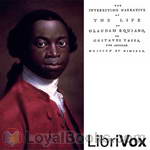 The Interesting Narrative of the Life of Olaudah Equiano, Or Gustavus Vassa, The African
The Interesting Narrative of the Life of Olaudah Equiano, Or Gustavus Vassa, The African
The Interesting Narrative of the Life of Olaudah Equiano, written in 1789, is the autobiography of Olaudah Equiano. It discusses his time spent in slavery, serving primarily on galleys, documents his attempts at becoming an independent man through his study of the Bible, and his eventual success in gaining his own freedom and in business thereafter. The book contains an interesting discussion of slavery in West Africa and illustrates how the experience differs from the dehumanising slavery of the Americas... | |
By: Henry Fielding (1707-1754) | |
|---|---|
 Journal of a Voyage to Lisbon
Journal of a Voyage to Lisbon
Sailing voyage from England to Portugal in the mid Eighteenth Century, by one of the premier humorists, satirists, novelists and playwrights of his age. It was to be his last work, as his failing health proved unable to persevere much longer after the voyage. | |
By: Thomas de Quincey (1785-1859) | |
|---|---|
 Confessions of an English Opium-Eater
Confessions of an English Opium-Eater
“Thou hast the keys of Paradise, O just, subtle, and mighty Opium!” Though apparently presenting the reader with a collage of poignant memories, temporal digressions and random anecdotes, the Confessions is a work of immense sophistication and certainly one of the most impressive and influential of all autobiographies. The work is of great appeal to the contemporary reader, displaying a nervous (postmodern?) self-awareness, a spiralling obsession with the enigmas of its own composition and significance... | |
By: James Boswell (1740-1795) | |
|---|---|
 The Life of Samuel Johnson
The Life of Samuel Johnson
Boswell’s Life of Samuel Johnson is widely considered to be the greatest English-language biography ever written. It was revolutionary in its efforts to represent Johnson as he was, celebrating his flaws as well as his genius, and in Boswell’s decision to represent Johnson primarily by quoting his writings and relating personal anecdotes rather than relying on matters of public record. From the time of its publication till now, The Life of Johnson has been one of the most popular and influential books ever written. | |
By: William Dean Howells (1837-1920) | |
|---|---|
 My Mark Twain
My Mark Twain
William Dean Howells (1837-1920) became fast friends with Mark Twain from the moment in 1869 when Twain strode into the office of The Atlantic Monthly in Boston to thank Howells, then its assistant editor, for his favorable review of Innocents Abroad. When Howells became editor a few years later, The Atlantic Monthly began serializing many of Twain’s works, among them his non-fiction masterpiece, Life on the Mississippi. In My Mark Twain, Howells pens a literary memoir that includes such fascinating scenes as their meetings with former president Ulysses Grant who was then writing the classic autobiography that Twain would underwrite in the largest publishing deal until that time... | |
By: Friedrich Nietzsche (1844-1900) | |
|---|---|
 Case of Wagner / Nietzsche Contra Wagner / Selected Aphorisms
Case of Wagner / Nietzsche Contra Wagner / Selected Aphorisms
A collection of three of Nietzsche's writings concerning the music of Wagner. In particular, he relates Wagner's music as degenerate, unrefined and unintelligent and relates it to a gradually degenerating German culture and society. The translator provides a detailed introduction. | |
By: Richard Jefferies (1848-1887) | |
|---|---|
 The Gamekeeper at Home
The Gamekeeper at Home
Richard Jefferies (1848 – 1887) was born and spent his childhood on a farm at Coate,Wiltshire. He joined the ‘Wiltshire and Gloucestershire Standard’ in 1868 and also started to write articles and pamphlets on various agricultural issues and local history topics. He is best known for his depiction of English rural life in essays, books of natural history, and novels. This classic of English nature writing gives an idea of the life of a gamekeeper in southern England in the second half of the nineteenth century. | |
By: Giacomo Casanova (1725-1798) | |
|---|---|
 The Memoirs of Jacques Casanova
The Memoirs of Jacques Casanova
This is the first of five volumes. – Giacomo Casanova (1725 in Venice – 1798 in Dux, Bohemia, now Duchcov, Czech Republic) was a famous Venetian adventurer, writer, and womanizer. He used charm, guile, threats, intimidation, and aggression, when necessary, to conquer women, sometimes leaving behind children or debt. In his autobiography Histoire de ma vie (Story of My Life), regarded as one of the most authentic sources of the customs and norms of European social life during the 18th century, he mentions 122 women with whom he had sex... | |
By: Peter Abelard (1079-1142) | |
|---|---|
 The Story of My Misfortunes
The Story of My Misfortunes
Autobiographies from remote historical periods can be especially fascinating. Modes of self-presentation vary greatly across the centuries, as of course does the very concept of Self. Peter Abelard, the medieval philosopher and composer, here gives a concise but vivid survey of his notoriously calamitous life. The work is couched in the form of a letter to an afflicted friend. Abelard’s abrasively competitive, often arrogant personality emerges at once in the brief Foreword, where he informs his correspondent: “(I)n comparing your sorrows with mine, you may discover that yours are in truth nought.. and so shall you come to bear them the more easily.” | |
By: Gaius Suetonius Tranquillus (c75 - c160 AD) | |
|---|---|
 The Lives of the Twelve Caesars
The Lives of the Twelve Caesars
The Twelve Caesars is a set of twelve biographies of Julius Caesar and the first 11 emperors of the Roman Empire. The work was written in 121 during the reign of the emperor Hadrian, while Suetonius was Hadrian’s personal secretary. On the Life of the Caesars concentrates on the acts and personalities of the Julio-Claudians and their immediate successors. Together with Tacitus’ Annals, this work is a major source for the historical details in Robert Graves’ novels “I Claudius” and “Claudius the God”. | |
By: Thomas Carlyle | |
|---|---|
 Early Kings of Norway
Early Kings of Norway
“The Icelanders, in their long winter, had a great habit of writing; and were, and still are, excellent in penmanship. It is to this fact, that any little history there is of the Norse Kings and their old tragedies, crimes and heroisms, is almost all due. The Icelanders, it seems, not only made beautiful letters on their paper or parchment, but were laudably observant and desirous of accuracy; and have left us such a collection of narratives (Sagas, literally “Says”) as, for quantity and quality, is unexampled among rude nations... | |